
Wes Vernon
Presidents' Day: do we really need it?
Also: The Screwtape Letters; and (Dis)"Honorable Survivor"- -at last, a Cold War traitor's confession
By Wes Vernon
Because of two back-to-back snowstorms, this city of Washington and your federal government were shut down for four days in a row. You can bemoan or celebrate that — as you wish — depending on whether you think the bureaucracy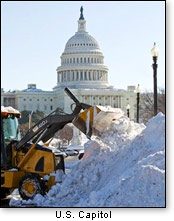 is a threat or a blessing, considering its enhanced size and increased powers (some of dubious constitutionality) and the proposed enlargement of its powers (read Health "Care" and Cap and Tax power grabs).
is a threat or a blessing, considering its enhanced size and increased powers (some of dubious constitutionality) and the proposed enlargement of its powers (read Health "Care" and Cap and Tax power grabs).
Be that as it may, someone has to be around the make sure our men and women in uniform are paid for defending us and that the Social Security checks are sent out to seniors who — notwithstanding the bottom that fell out of the stock market in 2008 — would be living better today if the gobs of money taken from their paychecks during their four or five working decades had instead been invested in the market.
For what it's worth, our government tells us its snowbound employees' forced absence cost us hundreds of millions in productivity.
But then, the four-day shutdown is followed by one day of work (Friday), which is then followed by a three-day weekend.
Presidents' Day
On Monday of this week, the federal workforce takes another day off from work in observance of Presidents' Day.
Presidents' Day? It used to be that we celebrated the birthday of George Washington — our first president — the only one to have been elected unanimously in the Electoral College — twice.
So what happened?
Washington's Birthday was originally officially celebrated on — well, his actual birthday — February 22. But then in 1968, the United States Congress passed the Monday Holidays Act, which changed the official observance of most "second tier" holidays to the third Monday in the relevant month. In 1971, that was applied to Presidents' Day — between February 15 and 21. That means Washington's Birthday can never be celebrated on the actual Feb. 22 birthday of George Washington.
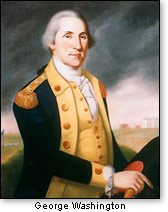 There were those who wanted to designate the official name of Presidents' Day to honor both Washington and Abraham Lincoln (Feb. 12), an idea that was nixed by Congress (there are still some hard feelings in the Old Confederacy). But five states actually call it Washington and Lincoln's Birthday. Alabama chooses to call it Washington and Jefferson's Birthday — even though Thomas Jefferson was born in April. Only 13 states officially designate the occasion Presidents' Day.
There were those who wanted to designate the official name of Presidents' Day to honor both Washington and Abraham Lincoln (Feb. 12), an idea that was nixed by Congress (there are still some hard feelings in the Old Confederacy). But five states actually call it Washington and Lincoln's Birthday. Alabama chooses to call it Washington and Jefferson's Birthday — even though Thomas Jefferson was born in April. Only 13 states officially designate the occasion Presidents' Day.
29 states (according to Conservapedia) still insist on officially calling the day Washington's Birthday. Given the homogenization of the populace by the national media, Americans living in those states are best qualified to say whether they unofficially observe the federal Presidents' Day.
What's in a name?
The biggest and most logical question about Presidents' Day is — why? What meaning is there in that? Presidents' Day? Which president(s)? James Buchanan? Andrew Johnson? Chester Arthur? Jimmy Carter? They were presidents. So what? They hardly distinguished themselves. If we're going to have a holiday honoring someone, shouldn't we be on the same page as to his/their name(s)?
Speaking of Chester Arthur, it was in his time that Washington's Birthday was officially proclaimed to apply as a day off for all federal offices. BTW — That was nearly 90 years after President Washington's Farewell Address and more than 80 years after his death.
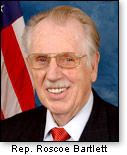 In recent years, Congressman Roscoe Bartlett has introduced legislation that would require the federal government to begin to restore the celebration of the George Washington Federal Holiday.
In recent years, Congressman Roscoe Bartlett has introduced legislation that would require the federal government to begin to restore the celebration of the George Washington Federal Holiday.
"A generic Presidents' Day diminishes the accomplishments of America's greatest presidents," according to the Maryland Republican. Moreover, he notes there has never — really — been a Presidents Day federal holiday. According to federal law, the holiday is "Washington's Birthday." — U.S. Code Title V Sec. 6103(a).
How long do we wait?
It took nearly a century to make George Washington's birthday a holiday of any kind. Our normal inclination is to hold off making anyone's birthday a holiday before a couple of generations have died off. That way, a person's place in history can be assessed by objective consensus after the passions of controversy surrounding that individual have receded.
Nothing wrong with naming a street, ball park, airport, or train station after someone who has contributed mightily to the common good while still alive or only recently departed. But an entire national holiday is more exclusive territory.
Speaking of which
The only exception is the Martin Luther King holiday — celebrated on the third Monday in January rather than necessarily on his real birthday — January 15.
If we wanted to honor a civil rights leader with a national holiday in his name, we could have chosen Frederick Douglass or Booker T. Washington. But many in today's generation have only a dim historical knowledge of those pioneers of King's cause — albeit in other eras (which doesn't say much for our public school system). Next time we run into a situation like this, will we engrave it in stone before future generations can have a look-see?
The fact is that in 2010, we are discouraged from saying out loud that we are honoring the birthday of George Washington — the Father of our country. If one were paranoid, one could say this is a subtle play to elitists who view the Founding Fathers as nothing more than "dead white males."
The Screwtape letters
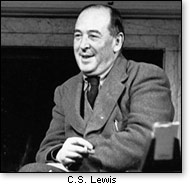 C.S. Lewis's scholarly writings on Christianity have won him accolades from those whose faith has always been strong, as well as from those who came to the Faith after reading and rejecting atheist writers of the last two centuries, notably — in recent times — Richard Dawkins and Christopher Hitchens.
C.S. Lewis's scholarly writings on Christianity have won him accolades from those whose faith has always been strong, as well as from those who came to the Faith after reading and rejecting atheist writers of the last two centuries, notably — in recent times — Richard Dawkins and Christopher Hitchens.
Lewis's novel The Screwtape Letters has been making the rounds lately in legitimate theatre, additional improvement touches being added as it draws sell-out performances in cities such as Chicago, New York, and Washington.
The letters in question are exchanged between a senior demon — named Screwtape — and a young demon — his nephew, whose name is Wormwood. Wormwood's assignment is to influence a young man living on Earth in wartime England — the idea being to lure him away from "the enemy" — aka God.
The young man — referred to as "the Patient" — is not being nudged by Wormwood to do something spectacularly evil. As Screwtape counsels his nephew, "The safest path to hell is the gradual one."
The performance — having packed them in at Washington's Lansburgh Theatre before and during the recent Christmas holidays, is scheduled for a return to New York's Westside Theatre in the Broadway district April 15-July 4. It is a delight.
The correspondence in The Screwtape Letters is not preachy to the audience. And yet in its own way, Lewis's views on theology, sex, love, gluttony, and pride come through — all the while being entertaining and — at times — quite amusing.
In 1959, Lewis added (in the Saturday Evening Post) a postscript to the novel — which was not dramatized in the current theatre version. (Too bad. It would have been dynamite.) In this short sequel, Screwtape delivers an after-dinner speech at the Tempters' Training College for young demons.
In it, the lead character proposes a toast to leveling trends (dumbing down) in public schools. The Cold War is discussed as an influence in education. Screwtape and his fellow demons clearly are out to subvert education in non-communist nations so as to aid the Communist effort to bring down Western civilization.
Here the postscript gets far more into a worldview than does the play itself.
John Stewart Service — in whose service?
Apologists for John Stewart Service started to have a field day when Lynne Joiner's recent book Honorable Survivor was released. The volume is arguably a whitewash of the State Department Foreign Service officer who played a key role in the downfall of China to the Communists in the years following World War II.
 The book paints Service as something of an innocent blunderbuss (my words, not Joiner's) who was unfairly hounded by the likes of J. Edgar Hoover, Joe McCarthy and Pat McCarran. (For background — see this column "McCarthy, Murrow and Enduring Myths — Part 2," 11/13/05. See also "Amerasia: McCarthy's weirdest cover-up case," 11/12/07.)
The book paints Service as something of an innocent blunderbuss (my words, not Joiner's) who was unfairly hounded by the likes of J. Edgar Hoover, Joe McCarthy and Pat McCarran. (For background — see this column "McCarthy, Murrow and Enduring Myths — Part 2," 11/13/05. See also "Amerasia: McCarthy's weirdest cover-up case," 11/12/07.)
What the whitewashers did not count on was a reviewer who actually knew "where the bodies are buried," so to speak. During his tour of China, Service roomed with identified communist agents Sol Adler (who had infiltrated the U.S. Treasury Dept.) and Ji Chaoding (who had infiltrated the Chinese Finance Ministry of the then pro-Western Chinese government). Adler had been identified under oath by Whittaker Chambers and Elizabeth Chambers as a member of a Communist underground apparatus.
Even before World War II had concluded, Service and Adler wrote favorable reports to the U.S. government in which they praised the then-rebel Chinese Communists and became increasingly harsh in their assessments of the Nationalist government of Chiang-Kai Shek — America's faithful wartime ally — as "fascist" and Gestapo-like."
Upon his return to the U.S., Service was caught on FBI surveillance as he passed vital information to a stalwart Stalinist, Phillip Jaffe. Then he was caught passing secrets to the publication Amerasia - a pro-Red Chinese transmission belt. In any honest investigation, Service would have ended up behind bars. (Again, for details on the cover-up, see previous columns listed above).
Senator McCarthy (a Republican) accused Service of being a loyalty and security risk. Senator McCarran (a Democrat) conducted a lengthy committee investigation of the subversion in our dealings with China in that era, and reached essentially the same conclusion.
According to Ms. Joiner's book, Service had said, "I was almost taken off my feet by the warmth and fervor and earnestness" of Communist Chinese leader Mao Zedong's request for American support. Joiner thinks Service was a poor misguided sap (again, my words).
The truth will out
The Wall Street Journal assigned the review of Honorable Survivor to Jonathan Mirsky, former East Asia editor for the Times of London.
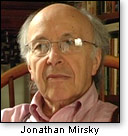 Mirsky reports on a conversation he had with Service before the latter died in 1999. Service admitted to Mirsky that he had given secret documents to communist agents. Those papers showed the exact position of the Nationalist forces facing Mao's troops.
Mirsky reports on a conversation he had with Service before the latter died in 1999. Service admitted to Mirsky that he had given secret documents to communist agents. Those papers showed the exact position of the Nationalist forces facing Mao's troops.
Mirsky continues: "When I observed that some might regard this as treason (I made no accusation), Service said he knew it," but added, "I just wanted to get it off my chest." He also said he "purposely ignored Mao's persecution, including executions of his perceived enemies." And this: Why cover for Mao? "I wanted them to win. I thought they were better than the Nationalists and that if we opposed them, we would have no access to the next Chinese government."
Mirsky says Service urged him to publish that conversation at that time, but friends of Service persuaded him not to do so. The reviewer apparently had forgotten about it until he was assigned to review Joiner's book.
His conclusion in the Dec. 20 WSJ: "If what Service told me near the end of his life is true, he can no longer be viewed as an innocent victim."
Think about that the next time you hear about how China holds hundreds of billions of our debt as it builds its own war machine and aids and abets our enemies in Iran, North Korea, and in Latin America.
© Wes Vernon
February 15, 2010
Because of two back-to-back snowstorms, this city of Washington and your federal government were shut down for four days in a row. You can bemoan or celebrate that — as you wish — depending on whether you think the bureaucracy
 is a threat or a blessing, considering its enhanced size and increased powers (some of dubious constitutionality) and the proposed enlargement of its powers (read Health "Care" and Cap and Tax power grabs).
is a threat or a blessing, considering its enhanced size and increased powers (some of dubious constitutionality) and the proposed enlargement of its powers (read Health "Care" and Cap and Tax power grabs).Be that as it may, someone has to be around the make sure our men and women in uniform are paid for defending us and that the Social Security checks are sent out to seniors who — notwithstanding the bottom that fell out of the stock market in 2008 — would be living better today if the gobs of money taken from their paychecks during their four or five working decades had instead been invested in the market.
For what it's worth, our government tells us its snowbound employees' forced absence cost us hundreds of millions in productivity.
But then, the four-day shutdown is followed by one day of work (Friday), which is then followed by a three-day weekend.
Presidents' Day
On Monday of this week, the federal workforce takes another day off from work in observance of Presidents' Day.
Presidents' Day? It used to be that we celebrated the birthday of George Washington — our first president — the only one to have been elected unanimously in the Electoral College — twice.
So what happened?
Washington's Birthday was originally officially celebrated on — well, his actual birthday — February 22. But then in 1968, the United States Congress passed the Monday Holidays Act, which changed the official observance of most "second tier" holidays to the third Monday in the relevant month. In 1971, that was applied to Presidents' Day — between February 15 and 21. That means Washington's Birthday can never be celebrated on the actual Feb. 22 birthday of George Washington.
 There were those who wanted to designate the official name of Presidents' Day to honor both Washington and Abraham Lincoln (Feb. 12), an idea that was nixed by Congress (there are still some hard feelings in the Old Confederacy). But five states actually call it Washington and Lincoln's Birthday. Alabama chooses to call it Washington and Jefferson's Birthday — even though Thomas Jefferson was born in April. Only 13 states officially designate the occasion Presidents' Day.
There were those who wanted to designate the official name of Presidents' Day to honor both Washington and Abraham Lincoln (Feb. 12), an idea that was nixed by Congress (there are still some hard feelings in the Old Confederacy). But five states actually call it Washington and Lincoln's Birthday. Alabama chooses to call it Washington and Jefferson's Birthday — even though Thomas Jefferson was born in April. Only 13 states officially designate the occasion Presidents' Day.29 states (according to Conservapedia) still insist on officially calling the day Washington's Birthday. Given the homogenization of the populace by the national media, Americans living in those states are best qualified to say whether they unofficially observe the federal Presidents' Day.
What's in a name?
The biggest and most logical question about Presidents' Day is — why? What meaning is there in that? Presidents' Day? Which president(s)? James Buchanan? Andrew Johnson? Chester Arthur? Jimmy Carter? They were presidents. So what? They hardly distinguished themselves. If we're going to have a holiday honoring someone, shouldn't we be on the same page as to his/their name(s)?
Speaking of Chester Arthur, it was in his time that Washington's Birthday was officially proclaimed to apply as a day off for all federal offices. BTW — That was nearly 90 years after President Washington's Farewell Address and more than 80 years after his death.
 In recent years, Congressman Roscoe Bartlett has introduced legislation that would require the federal government to begin to restore the celebration of the George Washington Federal Holiday.
In recent years, Congressman Roscoe Bartlett has introduced legislation that would require the federal government to begin to restore the celebration of the George Washington Federal Holiday."A generic Presidents' Day diminishes the accomplishments of America's greatest presidents," according to the Maryland Republican. Moreover, he notes there has never — really — been a Presidents Day federal holiday. According to federal law, the holiday is "Washington's Birthday." — U.S. Code Title V Sec. 6103(a).
How long do we wait?
It took nearly a century to make George Washington's birthday a holiday of any kind. Our normal inclination is to hold off making anyone's birthday a holiday before a couple of generations have died off. That way, a person's place in history can be assessed by objective consensus after the passions of controversy surrounding that individual have receded.
Nothing wrong with naming a street, ball park, airport, or train station after someone who has contributed mightily to the common good while still alive or only recently departed. But an entire national holiday is more exclusive territory.
Speaking of which
The only exception is the Martin Luther King holiday — celebrated on the third Monday in January rather than necessarily on his real birthday — January 15.
If we wanted to honor a civil rights leader with a national holiday in his name, we could have chosen Frederick Douglass or Booker T. Washington. But many in today's generation have only a dim historical knowledge of those pioneers of King's cause — albeit in other eras (which doesn't say much for our public school system). Next time we run into a situation like this, will we engrave it in stone before future generations can have a look-see?
The fact is that in 2010, we are discouraged from saying out loud that we are honoring the birthday of George Washington — the Father of our country. If one were paranoid, one could say this is a subtle play to elitists who view the Founding Fathers as nothing more than "dead white males."
The Screwtape letters
 C.S. Lewis's scholarly writings on Christianity have won him accolades from those whose faith has always been strong, as well as from those who came to the Faith after reading and rejecting atheist writers of the last two centuries, notably — in recent times — Richard Dawkins and Christopher Hitchens.
C.S. Lewis's scholarly writings on Christianity have won him accolades from those whose faith has always been strong, as well as from those who came to the Faith after reading and rejecting atheist writers of the last two centuries, notably — in recent times — Richard Dawkins and Christopher Hitchens.Lewis's novel The Screwtape Letters has been making the rounds lately in legitimate theatre, additional improvement touches being added as it draws sell-out performances in cities such as Chicago, New York, and Washington.
The letters in question are exchanged between a senior demon — named Screwtape — and a young demon — his nephew, whose name is Wormwood. Wormwood's assignment is to influence a young man living on Earth in wartime England — the idea being to lure him away from "the enemy" — aka God.
The young man — referred to as "the Patient" — is not being nudged by Wormwood to do something spectacularly evil. As Screwtape counsels his nephew, "The safest path to hell is the gradual one."
The performance — having packed them in at Washington's Lansburgh Theatre before and during the recent Christmas holidays, is scheduled for a return to New York's Westside Theatre in the Broadway district April 15-July 4. It is a delight.
The correspondence in The Screwtape Letters is not preachy to the audience. And yet in its own way, Lewis's views on theology, sex, love, gluttony, and pride come through — all the while being entertaining and — at times — quite amusing.
In 1959, Lewis added (in the Saturday Evening Post) a postscript to the novel — which was not dramatized in the current theatre version. (Too bad. It would have been dynamite.) In this short sequel, Screwtape delivers an after-dinner speech at the Tempters' Training College for young demons.
In it, the lead character proposes a toast to leveling trends (dumbing down) in public schools. The Cold War is discussed as an influence in education. Screwtape and his fellow demons clearly are out to subvert education in non-communist nations so as to aid the Communist effort to bring down Western civilization.
Here the postscript gets far more into a worldview than does the play itself.
John Stewart Service — in whose service?
Apologists for John Stewart Service started to have a field day when Lynne Joiner's recent book Honorable Survivor was released. The volume is arguably a whitewash of the State Department Foreign Service officer who played a key role in the downfall of China to the Communists in the years following World War II.
 The book paints Service as something of an innocent blunderbuss (my words, not Joiner's) who was unfairly hounded by the likes of J. Edgar Hoover, Joe McCarthy and Pat McCarran. (For background — see this column "McCarthy, Murrow and Enduring Myths — Part 2," 11/13/05. See also "Amerasia: McCarthy's weirdest cover-up case," 11/12/07.)
The book paints Service as something of an innocent blunderbuss (my words, not Joiner's) who was unfairly hounded by the likes of J. Edgar Hoover, Joe McCarthy and Pat McCarran. (For background — see this column "McCarthy, Murrow and Enduring Myths — Part 2," 11/13/05. See also "Amerasia: McCarthy's weirdest cover-up case," 11/12/07.)What the whitewashers did not count on was a reviewer who actually knew "where the bodies are buried," so to speak. During his tour of China, Service roomed with identified communist agents Sol Adler (who had infiltrated the U.S. Treasury Dept.) and Ji Chaoding (who had infiltrated the Chinese Finance Ministry of the then pro-Western Chinese government). Adler had been identified under oath by Whittaker Chambers and Elizabeth Chambers as a member of a Communist underground apparatus.
Even before World War II had concluded, Service and Adler wrote favorable reports to the U.S. government in which they praised the then-rebel Chinese Communists and became increasingly harsh in their assessments of the Nationalist government of Chiang-Kai Shek — America's faithful wartime ally — as "fascist" and Gestapo-like."
Upon his return to the U.S., Service was caught on FBI surveillance as he passed vital information to a stalwart Stalinist, Phillip Jaffe. Then he was caught passing secrets to the publication Amerasia - a pro-Red Chinese transmission belt. In any honest investigation, Service would have ended up behind bars. (Again, for details on the cover-up, see previous columns listed above).
Senator McCarthy (a Republican) accused Service of being a loyalty and security risk. Senator McCarran (a Democrat) conducted a lengthy committee investigation of the subversion in our dealings with China in that era, and reached essentially the same conclusion.
According to Ms. Joiner's book, Service had said, "I was almost taken off my feet by the warmth and fervor and earnestness" of Communist Chinese leader Mao Zedong's request for American support. Joiner thinks Service was a poor misguided sap (again, my words).
The truth will out
The Wall Street Journal assigned the review of Honorable Survivor to Jonathan Mirsky, former East Asia editor for the Times of London.
 Mirsky reports on a conversation he had with Service before the latter died in 1999. Service admitted to Mirsky that he had given secret documents to communist agents. Those papers showed the exact position of the Nationalist forces facing Mao's troops.
Mirsky reports on a conversation he had with Service before the latter died in 1999. Service admitted to Mirsky that he had given secret documents to communist agents. Those papers showed the exact position of the Nationalist forces facing Mao's troops.Mirsky continues: "When I observed that some might regard this as treason (I made no accusation), Service said he knew it," but added, "I just wanted to get it off my chest." He also said he "purposely ignored Mao's persecution, including executions of his perceived enemies." And this: Why cover for Mao? "I wanted them to win. I thought they were better than the Nationalists and that if we opposed them, we would have no access to the next Chinese government."
Mirsky says Service urged him to publish that conversation at that time, but friends of Service persuaded him not to do so. The reviewer apparently had forgotten about it until he was assigned to review Joiner's book.
His conclusion in the Dec. 20 WSJ: "If what Service told me near the end of his life is true, he can no longer be viewed as an innocent victim."
Think about that the next time you hear about how China holds hundreds of billions of our debt as it builds its own war machine and aids and abets our enemies in Iran, North Korea, and in Latin America.
© Wes Vernon
The views expressed by RenewAmerica columnists are their own and do not necessarily reflect the position of RenewAmerica or its affiliates.
(See RenewAmerica's publishing standards.)



















